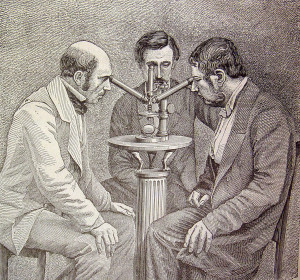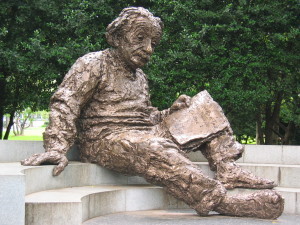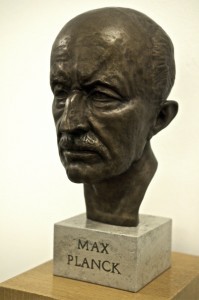“There is Nothing New to be Discovered”
 There are times when we encounter willful ignorance so spectacular that we stand in humble awe of it. How is it possible for an adult human being in the year 2016 to remain entirely unaware of every bit of modern afterlife evidence?
There are times when we encounter willful ignorance so spectacular that we stand in humble awe of it. How is it possible for an adult human being in the year 2016 to remain entirely unaware of every bit of modern afterlife evidence?
Incredibly, there is one physicist who claims to be so unaware. According to a recent interview in Scientific American, Sean Carroll of the California Institute of Technology argues in his new book, The Big Picture: On the Origin of Life, Meaning, and the Universe Itself that “There is just no such thing as God, or ghosts, or human souls that reside outside of the body. Everything in existence belongs to the natural world and is accessible to science.”
This interview is prickly with bogus assumptions introduced by both interviewer and interviewee. That the only alternative to materialist science is religion; that “natural” and “supernatural” are meaningfully distinct; that the “natural world” cannot be greater than what modern science considers to be natural; that “natural” and “material” are therefore rough synonyms; and that the mere refusal to  notice phenomena must mean that they probably do not exist are all cheerfully assumed to be fact. It is on some level adorable to watch educated adults conversing this way, pretending a narrow naivety, in much the same way that it is adorable to watch a tea party of children pretending to be grownups.
notice phenomena must mean that they probably do not exist are all cheerfully assumed to be fact. It is on some level adorable to watch educated adults conversing this way, pretending a narrow naivety, in much the same way that it is adorable to watch a tea party of children pretending to be grownups.
And their resolute ignorance runs deep. To quote Dr. Carroll, “I would make the argument that if there were a supernatural element that played a role in our everyday life in some noticeable way, it’s very, very likely we would have noticed it. It just seems weird that this kind of thing would be so crucial and yet so difficult to notice in any controlled scientific way. I would make the case that it is sufficiently unlikely in a fair Bayesian accounting that we don’t need to spend any time thinking about it anymore. Five hundred years ago it would have been a possibility. I think these days we’re ready to move on.” His worry is that if we give up on God, we might then give up on finding meaning in life, so he has written a book on how we might find that meaning within a materialist framework. It is an undertaking at once well-meant and ridiculous.
Even Dr. Carroll must be aware, as Albert Einstein said decades ago, that “Concerning  matter, we have been all wrong. What we have called matter is energy, whose vibration has been so lowered as to be perceptible to the senses. There is no matter.” Max Planck, the father of quantum mechanics, agrees that “there is no matter as such.” Dr. Planck goes further, asserting in 1931 that “I regard consciousness as fundamental. I regard matter as derivative from consciousness. We cannot get behind consciousness. Everything that we talk about, everything that we regard as existing, postulates consciousness.” So Max Planck actually said that consciousness must pre-date matter? And this is not a red flag for Dr. Carroll?
matter, we have been all wrong. What we have called matter is energy, whose vibration has been so lowered as to be perceptible to the senses. There is no matter.” Max Planck, the father of quantum mechanics, agrees that “there is no matter as such.” Dr. Planck goes further, asserting in 1931 that “I regard consciousness as fundamental. I regard matter as derivative from consciousness. We cannot get behind consciousness. Everything that we talk about, everything that we regard as existing, postulates consciousness.” So Max Planck actually said that consciousness must pre-date matter? And this is not a red flag for Dr. Carroll?
Apparently not. And he remains so cheerily oblivious to any sort of afterlife-related phenomena that he feels safe enough within the echo chamber that is modern materialist science to advocate for the party line without fearing that he will be made to look foolish.
Dr. Carroll is in good company. At the turn of the previous century there was the same sort of tribal certainty among physicists that they had it all figured out. For example, in an address to the British Association for the Advancement of Science held in 1900, William Thomson, Lord Kelvin, reportedly said, “There is nothing new to be discovered in physics now. All that remains is more and more precise measurement.”
Albert Michelson, winner of the 1931 Nobel Prize in Physics, echoed Lord Kelvin in 1903, saying, “The more important fundamental laws and facts of physical science have all been discovered, and these are so firmly established that the possibility of their ever being supplanted in consequence of new discoveries is exceedingly remote…. [I]nstances might be cited, but these will suffice to justify the statement that ‘our future discoveries must be looked for in the sixth place of decimals’.”
Obviously Dr. Michelson’s Nobel Prize was for his work with light and not for his skills at  prognostication! Fifteen years after he uttered those words, Max Planck won the 1918 Nobel Prize in Physics as the father of quantum mechanics. And all those physicists who had assumed that everything already had been discovered were left to try to live down their words.
prognostication! Fifteen years after he uttered those words, Max Planck won the 1918 Nobel Prize in Physics as the father of quantum mechanics. And all those physicists who had assumed that everything already had been discovered were left to try to live down their words.
Sadly, so it also will be for our poor friend, Sean Carroll. It won’t be more than a decade or two before his book makes him a laughingstock, since we are confidently told by those we used to think were dead that there will soon be good electronic communication between their level of reality and our own. And meanwhile, beyond the ken of dogma-bound types like Dr. Carroll, scientists who retain their curiosity continue to make progress in building bridges between our benighted present and that glorious, unfettered future that begins when scientists will no longer be forced to constrain what they investigate in order to avoid inadvertently finding God.
photo credit: Little A – 4 via photopin (license)
The post “There is Nothing New to be Discovered” appeared first on Roberta Grimes.



